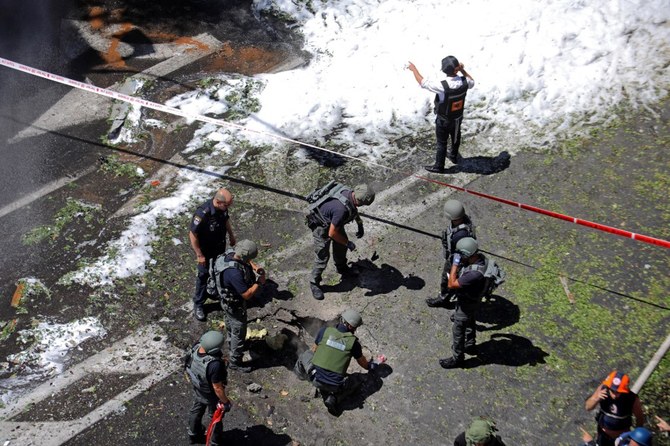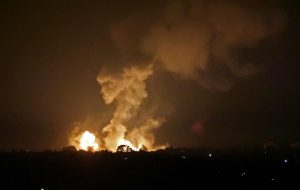
- ARAB NEWS
- 30 Jun 2025

GAZA CITY: Two rockets fired from Gaza early Saturday fell into the Mediterranean Sea off the coast of Tel Aviv, prompting Israeli retaliatory fire on Hamas positions. No injuries have so far been reported from both sides.
Hamas and Israel exchanged indirect messages through Egypt to prevent the situation from deteriorating.
Hamas military sources said the launch was not deliberate and was caused by a malfunction due to bad weather.
The Israeli army said that two rockets were launched from Gaza toward the sea off Tel Aviv, but the sirens did not go off, nor did the Iron Dome system launch missiles to intercept the rockets.
Israeli police received reports from citizens about hearing an explosion but no damage or injuries were reported, according to the Israeli army statement.
Palestinian and Israeli media said that Egypt immediately rushed to mediate between the two parties in order to prevent an escalation in Gaza.
A website close to the Ezz El Din Al-Qassam Brigades, the military wing of Hamas, quoted an unnamed source as saying that the two missiles were fired due to weather conditions, and that there were no missile tests.
After darkness fell, Israeli forces hit back, striking “terrorist targets in the Gaza Strip.”
In a statement, the Israeli military said its tanks targeted a rocket-propelled grenade production complex and Hamas positions in Khan Yunis as a measured response to the Hamas rocketfire.

Hamas Radio said also some of the group’s security posts and a training camp were targeted by Israeli aircraft and tanks. There were no immediate reports of casualties.
‘The past few days have witnessed an intensification of Hamas firing experimental rockets toward the sea.
The Egyptian mediator conveyed to Hamas that “Israel is not convinced by these old arguments. They provided evidence that the rockets came out due to the weather,” Israel’s Channel 13 reported.
It was the first time that Israel announced the detection of rockets from Gaza off the coast of Tel Aviv since the last war in May 2021.
In the winter of last year, a similar incident occurred when rockets were launched from Gaza, which Hamas also explained as being the result of bad weather.
The security situation became tense last Wednesday after Israeli tanks bombed Hamas posts in northern Gaza, against the backdrop of Israel’s announcement that an Israeli had been wounded by gunfire from Gaza.
Following the fall of the two missiles, Israel’s security and military level sectors held a “security assessment session” and, according to the military correspondent for Israel’s Walla website Amir Bukhbut, “some Israeli security authorities believe Hamas’s narrative, but the weak response from Israel will show its weakness, and a strong response may lead to another response.”
No Palestinian faction has claimed responsibility for firing the two rockets.
Israel’s Channel 14 said: “This is a test for the (Israeli Prime Minister Naftali) Bennett government. Either it responds, or it continues to ignore, as was the case in the sniper incident last week.”
Palestinian observers said that if Israel decided to respond, its response would be limited.
Ibrahim Abrash, a professor of political science at Al-Azhar University in Gaza, said it would be difficult for the Israeli government to give a “big response” in light of the continuation of talks to reach a truce and in light of no approval from Washington for any escalation in Gaza.
He said Israel would find in the failure of any Palestinian faction to take responsibility for the rockets a convincing justification before its people for not responding strongly. On the other hand, the factions in Gaza realized that “the cost of a new war will be very high.”
This incident coincides with the anger of Hamas and its ally Islamic Jihad over issues related to the siege and the reconstruction process, and the prisoners in Israeli prisons.
Since the end of the last war, the process of rebuilding the Gaza Strip has been faltering, which has increased the frequency of threats by Hamas and Islamic Jihad in an attempt to pressure Israel and donor countries to speed up the reconstruction process.
(With Reuters)